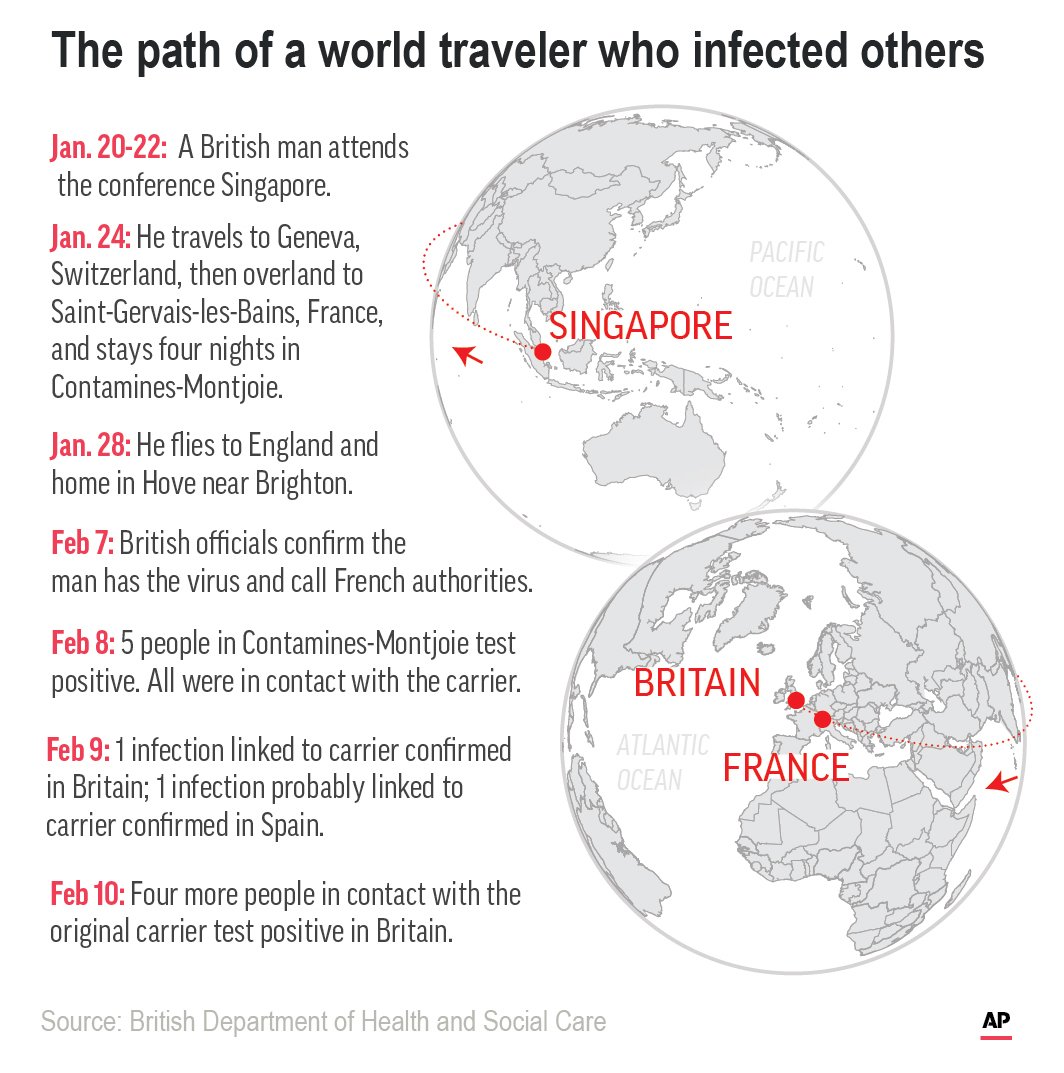A vacationing British businessman may have unintentionally spread the novel coronavirus across at least three European countries, according to health authorities.

The man likely caught the virus, formally known as 2019-nCoV, on a business trip to Singapore in January.
Now, the same man is being linked to around 10 cases of the novel coronavirus across Europe.
Dr. Tedros Adhanom Ghebreyesus, the director-general of the World Health Organization, said Monday that the spread of the virus among people who hadn’t been to China — like this U.K. traveller — was concerning.
“The detection of this small number of cases could be the spark that becomes a bigger fire.”
“But for now, it’s only a spark,” he said. “Our objective remains containment.
“We call on all countries to use the window of opportunity we have to prevent a bigger fire.”
Health officials around the world have been tracing this man’s path to identify contacts in order to prevent the virus’ spread.
Here’s how it started.
The man’s employer, the British industrial sensor company Sermovex, held a conference at Singapore’s five-star Grand Hyatt Hotel from Jan. 20 to 22. At the time, there were 94 foreigners at the hotel, including some from Hubei province, the epicentre of the novel coronavirus outbreak.
The hotel said it was informed by Singapore’s Ministry of Health that three people who attended the conference experienced symptoms after returning to their home countries of Malaysia and South Korea and have now been diagnosed with the virus.
The British man, who has not been named by the authorities, is also thought to have caught the virus in Singapore.

Get weekly health news
Then, he went on vacation.
He stayed in Les Contamines-Montjoie, France, a ski resort in the Alps, from Jan. 24 to 28. He stayed in a chalet shared by 11 people, all British nationals.
Five of them have now tested positive for the virus, including a nine-year-old child, according to French officials. Everyone who stayed at the chalet is under observation, and people in the village lined up for tests.
Two local schools, which the infected child had visited, have been temporarily closed.
Jerome Salomon, head of France’s national health agency, said that in the wake of the episode, 61 people, including many children who went to school with the boy, were tested and proved negative for the virus.
As of Feb. 10, France is reporting 11 confirmed cases of the novel coronavirus, according to the World Health Organization.
But the virus didn’t end in France. Another British man, who had also stayed at a French ski resort, was discovered to be infected after returning to his home on the Spanish island of Mallorca. He may be linked to the same trail of cases.
Four other British nationals, all connected to the business traveller from Singapore, have tested positive for the virus in the U.K., officials say. They all caught the virus in France.
There were only eight confirmed cases of nCoV in the U.K. as of Monday.
Two of them are health care workers, according to British officials.

And then, the businessman came home.
He flew back to Britain on Jan. 28 on an EasyJet flight from Geneva to London’s Gatwick Airport. The airline did not disclose how many people were aboard, but said England’s public health agency is contacting all passengers who were seated near the man.
Once back in Britain, the businessman visited The Grenadier pub in Hove, which said it was told by the public health agency that there was “minimal ongoing risk of infection” to guests or staff.
The apparent ease with which virus spread raises concern that some of the 90 others who attended the conference may also have been infected and “may go on to initiate chains of infection in their home countries,” said Dr. Nathalie MacDermott, a clinical lecturer at King’s College London.
“It does appear that the index case has passed on the infection to an unusually large number of contacts,’’ said Dr. Andrew Freedman, an expert on infectious diseases at Cardiff University.
“As such, he could be termed a ‘super-spreader.’’’
Dr. Michael Ryan, WHO’s emergencies chief, disagreed, saying, “It’s way too early and much more of an exaggeration to consider the Singapore conference event a superspreading event.”
— with files from Reuters and the Associated Press











Comments
Want to discuss? Please read our Commenting Policy first.